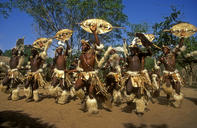Kingdom of Zulu
During the 19th century, the Zulu nation of South Africa built their monarchy in the area now known as Zululand. The nation’s homestead extended from the Tugela River in the south to the Pongola River in the north. The Zulu were Nguni-speaking people and originally settled near the White Umfolozi River.

Under the rule of King Shaka, the nation rose to power through militaristic strategy. Shaka’s successors clashed with the Afrikaner boers in 1838, and around 3000 Zulus were killed at the Battle of Blood River.
In 1879, the British Empire invaded and started the Anglo-Zulu war. The Zulu were victorious at the battle of Isandlwana, but the British eventually won and defeated the Zulu at the battle of Ulundi. The Zulu's were annexed in 1887 and became part of Natal in 1897.
KwaZulu became a province of the Union of South Africa in 1910. The South African government made Native Reserves independent areas through the Promotion of Bantu Self-Government Act of 1959, and the area in which the Zulu resided was made the ‘Zulu homeland’.
With the end of the apartheid system in the early 1990s, the scattered blocks of KwaZulu were fused with Natal to form the new province of KwaZulu-Natal in 1994.